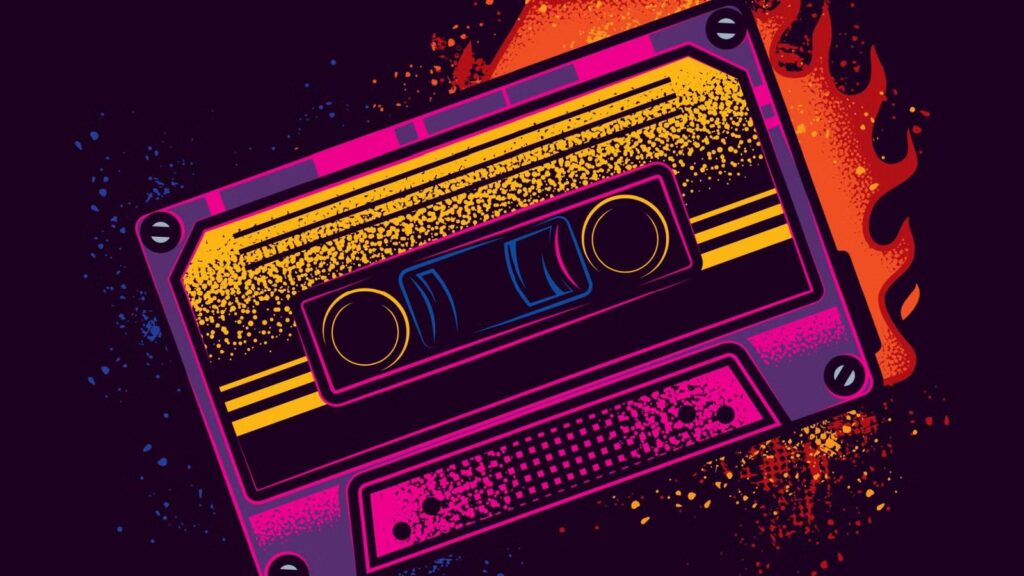So, for some inexplicable reason, cassette tape collecting is now also a thing alongside vinyl. This time there aren’t even any arguments about analog sound quality, it just seems to be a vibe but, hey, you do you!
However, if you’re building a cassette collection, or you have one from before, you should know that this form of physical media is significantly more vulnerable to degrading than, for example, CDs.
Magnetic Music Was Never Meant to Last Forever
It’s important to remember that, unlike vinyl and later CDs, cassettes were never designed to be a long-lasting medium in the first place. This was a portable, inexpensive, and convenient format you could listen to in a car, or on portable players like the revolutionary Sony Walkman.
Credit: Lucas Gouveia/How-To Geek | Gecko Studio/Shutterstock
Inside a cassette is a long spool of plastic tape covered with a magnetic medium that holds the recording as analog magnetic fluctuations. Even if you do nothing, even if the tape is sealed and unopened, those magnetic particles lose their alignment over time and the quality of the recording fades.
The Science of Slow Decay
Cassette tapes can fail in various ways, either over time or spontaneously. The worst offender is, however, something known as binder breakdown or sticky-shed syndrome.
Credit: Momentum studio / Shutterstock.com
The binder is the adhesive that holds the magnetic layer to its plastic carrier. Binder breakdown doesn’t affect all tapes equally. It’s all down to the formulation of the binder used by the manufacturer. Some binder formulas absorb too much moisture over time, causing the separation. Rendering the tape unusable. However, it’s safer to assume that your cassettes will develop some sort of binder breakdown or other similar issue over time, and act accordingly.
Also, not all binder issues are specifically due to moisture or specifically sticky-shed. Whatever the reason the binder has broken down, it’s not good news for your cassette!
Storage Conditions Can Make or Break Them
How your cassettes have been stored has an effect on how quickly these age-related failures happen or whether they will happen at all. Too much heat, such as from being in a box baked by sunlight, or next to a heat source over the long term accelerates chemical breakdown. High humidity is involved in moisture absorption, but can also cause issues like mold.
Dust can infiltrate the reels, direct UV light exposure can fade, warp, and generally end the useful lifespan of a cassette in short order too. The worst environments— basements, attics, glove compartments—are also the most common places old tapes end up.
The advice here is the same as it always is for physical media. Store your cassettes somewhere cool and dry, out of direct sunlight, and preferably at least somewhat sealed against dust.
Cassette Decks Aren’t Getting Any Younger Either
Credit: Jordan Gloor / How-To Geek
Tapes are also vulnerable to wear from simply being played. The more you play a tape, the more dust on the tape’s surface damages it as the head passes over. Which is one important reason to minimize dust, and why tapes should be kept in their cases. The force of the motors in your tape deck also stretches the tape out over time, and worn tapes develop unstable sound reproduction.
This is inevitable, but a poorly maintained or malfunctioning cassette player can make it worse, or even destroy your cassette tapes. Now, it is possible to buy brand-new tape decks, but if you’re still using an old player, you should have it serviced to ensure that it doesn’t harm your tapes.
This isn’t always easy to do yourself, and finding a professional who still works on cassette players might be tough, but it’s worth it if you want to get a few more years both from your player and from your cassettes.
Digitize Now or Lose Them Forever
Credit: Lucas Gouveia / How-To Geek | ulrich22 / Hulahop / Shutterstock
Your cassettes are on a countdown timer with an unknown amount of time on the counter. So if you care about their contents, it’s imperative that you make digital copies of them as soon as possible. Any good tape deck with a line-out function can be connected to your computer and allow you to digitize your tapes.
However, most modern cassette tape players have a built-in function to copy the contents of a cassette to MP3 or other suitable formats. So it might all be easier than you think. That said, most of your cassette collection is probably available in a much higher quality format, like CD. So you probably only need to preserve rare tapes that don’t have a release in other formats, or personal recordings.

